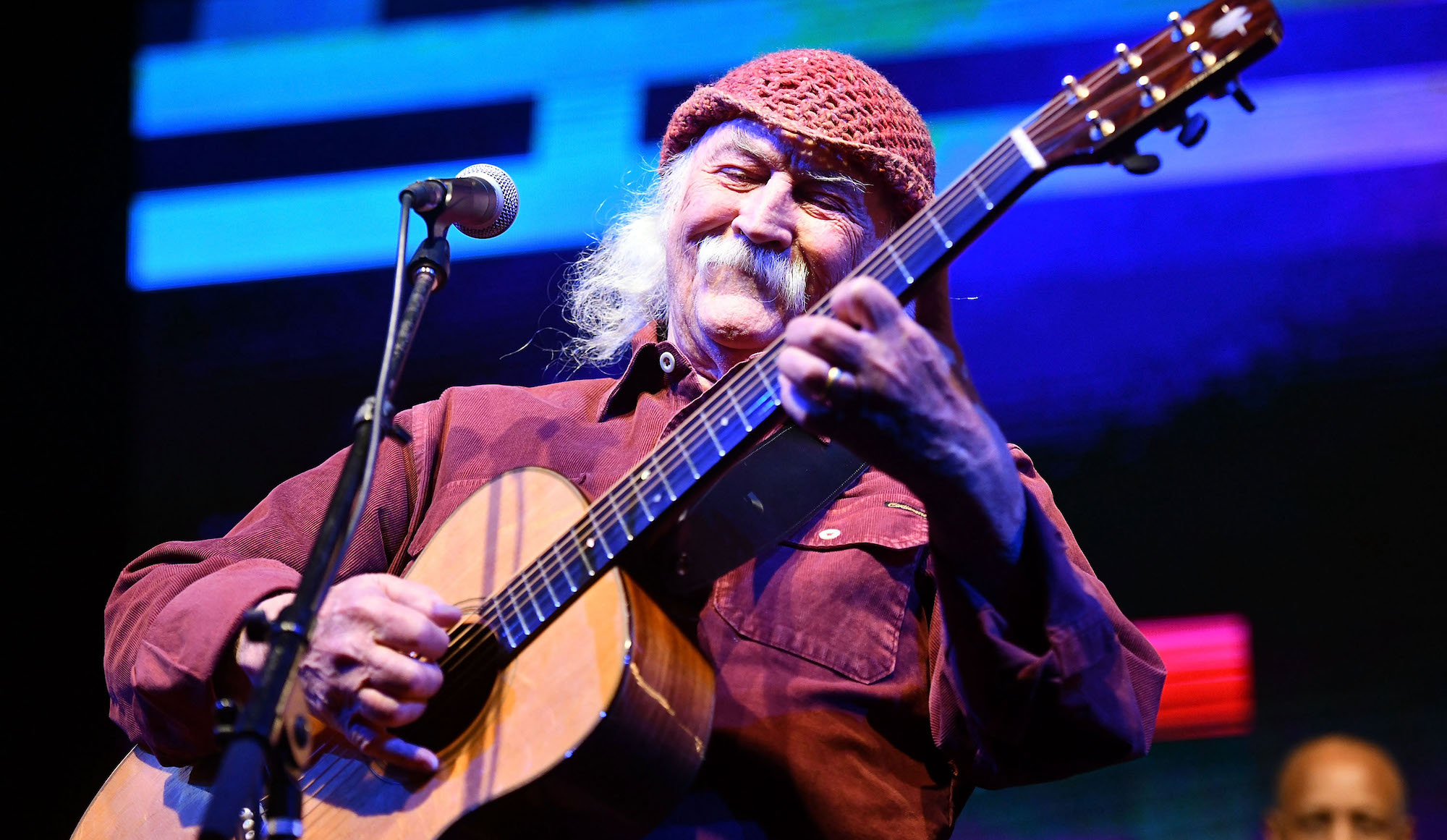David Crosby, co-founder and guitarist of the Byrds, Crosby, Stills, Nash & Young, dies at 81
Crosby's death was confirmed by his wife, who said, "His legacy will continue to live on through his legendary music"

David Crosby, guitarist and co-founder of the Byrds and Crosby, Stills, Nash & Young, has died at the age of 81.
The singer's death was confirmed by his wife, Jan, in a statement to Variety.
“It is with great sadness after a long illness, that our beloved David (Croz) Crosby has passed away," the statement reads. "He was lovingly surrounded by his wife and soulmate Jan and son Django. Although he is no longer here with us, his humanity and kind soul will continue to guide and inspire us.
"His legacy will continue to live on through his legendary music," it went on. "Peace, love, and harmony to all who knew David and those he touched. We will miss him dearly. At this time, we respectfully and kindly ask for privacy as we grieve and try to deal with our profound loss. Thank you for the love and prayers.”
As a founding member and guitar player for the Byrds and Crosby, Stills & Nash (and sometimes Young), David Crosby was a hugely influential figure in the development of rock in the '60s and '70s. His distinct songwriting and guitar playing played an incalculable role in shaping the sound of both acts, who in turn influenced countless guitarists and musicians in their wake, and sold millions of records each.
Born in Los Angeles in 1941, Crosby took up the guitar in his teens, and developed an interest in folk music. A veteran of the burgeoning coffeehouse folk circuit by his early 20s, Crosby met fellow young coffeehouse singer/songwriters Jim (later known as Roger) McGuinn and Gene Clark in the early '60s. Those three, in turn, would form the core of the Byrds.
In 1965, for their debut single, the Byrds recorded (with some help from LA session kings The Wrecking Crew) a then-unreleased Bob Dylan song called Mr. Tambourine Man. Blending Dylan's deep lyricism with light, jangling instrumentation, the song was not only a Number 1 hit, but a true game-changer that almost single-handedly invented the folk-rock genre.
Get The Pick Newsletter
All the latest guitar news, interviews, lessons, reviews, deals and more, direct to your inbox!
Before the close of 1965, the Byrds, incredibly, scored a second chart-topper in the form of Turn! Turn! Turn!, a Pete Seeger tune based on the Book Of Ecclesiastes.
The band's astonishing commercial success gave them some breathing room to experiment, and – especially after Gene Clark's departure in early 1966 – afforded Crosby, the band's rhythm guitarist, more opportunities to stand out.
Crosby made a number of songwriting contributions to the band's 1966 album, Fifth Dimension, and 1967's Younger Than Yesterday, but – after becoming increasingly vocal about his dissatisfaction with the group's musical direction – was fired by McGuinn during the sessions for the band's 1968 album, The Notorious Byrd Brothers.
In 1968, after he was fired, Crosby began spending time and jamming with one Stephen Stills, formerly of then-recently-disbanded Buffalo Springfield. The duo would later be joined by Graham Nash, formerly of The Hollies, and would soon go on to greater success than even The Byrds had found.
With their rock supergroup cred, complex, brilliantly-realized songwriting, and radio-friendly harmonies, Crosby, Stills & Nash were an immediate sensation.
The trio's 1969 self-titled debut album – highlighted in part by Crosby's Guinnevere, Wooden Ships and Long Time Gone – was a huge hit and, more significantly, played a massive role in shaping the laid-back, harmony-powered, West Coast soft-rock sound that would dominate charts throughout the 1970s.
With the addition of Neil Young, CSN became CSNY, and released the seminal Déjà Vu LP in 1970. Though he didn't contribute any hit singles to the album, Crosby's defiant, hard-rocking Almost Cut My Hair became a counterculture anthem, and one of the defining songs of his career.
Following CSN(Y)'s success, Crosby launched his solo career with 1971's If I Could Only Remember My Name, an eclectic but strong effort that featured a who's who of rock royalty as guests. Commercially successful at the time of its release, the album's eerie, atmospheric sound also was hugely influential to indie-folk musicians decades later.
Egos, drugs and other complications clouded the CSN(Y) story for the remainder of the '70s, with Crosby in particular struggling with a much-publicized battle with addiction in the '70s and '80s.
Even after Crosby, Stills & Nash dissolved for good in 2015, though – after a period of revitalization in the 1990s and 2000s – Crosby remained an active performer, and entered, ironically, the most prolific period of his career.
In the face of health issues and personal tragedy, in the final decade of his life, Crosby released five new studio albums. His final solo album, For Free, was released in 2021.
"My job in this life is to make music," Crosby told grammy.com in 2019. "It's the one contribution I can make... It's the one place I can lift. I do have to do it... it is necessary that I do it, but it is also my chief desire. It's a place I can contribute."
Jackson is an Associate Editor at GuitarWorld.com. He’s been writing and editing stories about new gear, technique and guitar-driven music both old and new since 2014, and has also written extensively on the same topics for Guitar Player. Elsewhere, his album reviews and essays have appeared in Louder and Unrecorded. Though open to music of all kinds, his greatest love has always been indie, and everything that falls under its massive umbrella. To that end, you can find him on Twitter crowing about whatever great new guitar band you need to drop everything to hear right now.
“There’d been three-minute solos, which were just ridiculous – and knackering to play live!” Stoner-doom merchants Sergeant Thunderhoof may have toned down the self-indulgence, but their 10-minute epics still get medieval on your eardrums
“There’s a slight latency in there. You can’t be super-accurate”: Yngwie Malmsteen names the guitar picks that don’t work for shred











